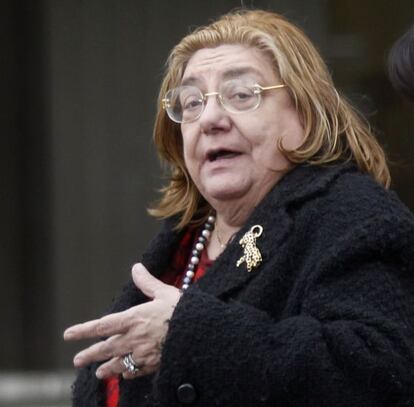“Disturbingly unstable” judge faces criminal charges for misconduct
Coro Cillán best known for having reopened probe into 2004 Madrid bombings


Over the past 13 years, Judge Coro Cillán has repeatedly incurred disciplinary sanctions for reiterated lengthy delays in her professional work. In many cases, she often failed to issue a ruling, or did so after an unjustifiable length of time — in one case, three years after the hearing. Despite these sanctions, she has continued to impart justice.
On Tuesday the permanent committee of Spain’s legal watchdog, the General Council of the Judiciary (CGPJ), once again initiated procedures for her cautionary suspension. This time the causes are even more serious: in a ruling issued on March 19, the regional High Court of Madrid opened a hearing against her for the criminal offense of breach of legal duty. The terms of the investigation require her to post a 17,000-euro bond.
The judge is accused of having acted in a manner that favored a friend of hers in a case involving a dispute over a nightclub.
The committee has given the prosecutor and the judge herself three days to set forth their cases. Next week, in a meeting planned for Tuesday or Wednesday, a definitive decision will be made. Given that a judicial hearing has already been opened against Cillán, it seems likely that she will be suspended from her duties until the court rules for or against her.
The law establishes that suspension of judges will, among other reasons, take place “when proceedings have been initiated against them for crimes committed in the exercise of their functions.”
The judge is accused of having acted in a manner that favored a friend of hers in a case involving a dispute over a nightclub.
Cillán was on duty in the Plaza de Castilla courthouse on September 21, 2011 when she received a complaint from a group of partners in the Madrid nightclub Moma, who were calling for the police to seal off the premises and for the courts to enforce a change of the administrators of the business. Other partners were against this move.
Against the criteria of the public prosecutor, Cillán agreed to close the business, and retained jurisdiction of the proceedings, instead of sending the case to another court that had previously intervened in the conflict. She also appointed a supposed close friend of hers as one of the new managers of the business, granting him expenses of 18,000 euros per month, which were later reduced. “Moma will be closed, because I bloody well say so,” she told the prosecutor, as he later testified in the CGPJ’s investigation. The prosecutor, Conrado Saiz, also said that in his opinion the judge was “incapable of running a court” on account of her “disturbing instability.”
Judge Cillán is best known for her attempt to reopen the investigation into the March 11, 2004 bombings of commuter trains in Madrid, in which almost 200 people were killed.
In the aftermath of the terrorist attack, it soon became clear that the bombs were the work of Islamist terrorists enraged by Spain’s participation in the Iraq war; but for political advantage a media-driven conspiracy theory attempted to shift the blame to “fixers” from the Socialist Party and the Basque terrorists of ETA. Even in the face of overwhelming evidence that radical Islamists had carried out the attack, the case dragged on for years until the Supreme Court finally dismissed it in 2009. In 2012, at the instigation of an extreme-right group, Cillán brought the case back into court, repeatedly calling police officers and others to testify.
In her courtroom, a number of the great conspiracy theories regarding the Madrid bombings were trotted out once more. They involved the rucksack bomb that failed to explode on that tragic day, and which led investigators to the terrorists behind the attack; the alleged destruction or manipulation of the explosive traces found in the locations of the attacks; the eventual destination of the scrap metal left behind from the trains in which the bombs exploded; the alleged involvement of ETA in the attacks; and even a supposed plot involving the Spanish secret services, a Socialist leader and a police officer.
Over a period of two years, the judge questioned more than 50 members of the police bomb squad, a dozen or so employees of the Renfe rail company, eight forensic police officers, and all of the investigators involved in the case, until a higher court finally quashed the proceedings.
Another of her attention-grabbing moves came in April 2011, when the Madrid Association of Atheists and Freethinkers (AMAL) had organized a protest march or “atheist procession” as an alternative to the numerous Catholic religious processions that monopolize many streets of central Madrid at Easter. Once again at the instigation of an extreme-right group, Cillán opened judicial proceedings against them.
Tu suscripción se está usando en otro dispositivo
¿Quieres añadir otro usuario a tu suscripción?
Si continúas leyendo en este dispositivo, no se podrá leer en el otro.
FlechaTu suscripción se está usando en otro dispositivo y solo puedes acceder a EL PAÍS desde un dispositivo a la vez.
Si quieres compartir tu cuenta, cambia tu suscripción a la modalidad Premium, así podrás añadir otro usuario. Cada uno accederá con su propia cuenta de email, lo que os permitirá personalizar vuestra experiencia en EL PAÍS.
¿Tienes una suscripción de empresa? Accede aquí para contratar más cuentas.
En el caso de no saber quién está usando tu cuenta, te recomendamos cambiar tu contraseña aquí.
Si decides continuar compartiendo tu cuenta, este mensaje se mostrará en tu dispositivo y en el de la otra persona que está usando tu cuenta de forma indefinida, afectando a tu experiencia de lectura. Puedes consultar aquí los términos y condiciones de la suscripción digital.








































